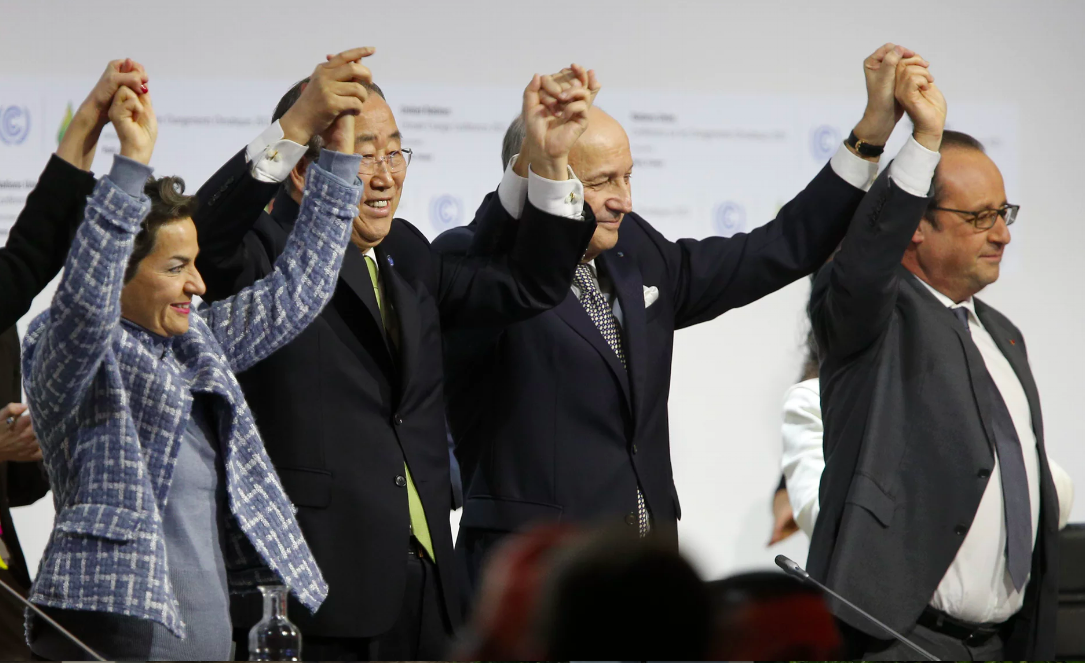Almost a year ago, 197 nation states came together to create the Paris Treaty. Thirteen days of talks resulted in a groundbreaking agreement which would unite individuals and nations against the damage caused by climate change.
Solutions for Climate Change are on the table. They are ours for the taking, let us have the courage to grasp them.- Ban Ki-Moon, UN Secretary General
Ban Ki-Moon's optimism echoed globally, with individuals and nations seriously considering how we could step forward together and halt the damage we are doing to the world. The Paris Treaty recognised climate change as a "potentially irreversible threat to human societies and the planet" and emphasised the urgency of solving the issue.At its most basic level, the treaty involved countries pledging to keep the rise in global temperatures over the next century to between 1.5 to 2 degrees celsius (34.7-35.6 degrees fahrenheit). Although the treaty was criticised at the time for failing to specifically mention fossil fuels, the treaty was seen as a strong first step in reshaping global approaches to climate change. Take a look here for a more detailed outline of what the Paris Treaty has set out to achieve.

Caption: Executive Secretary Christina Figures, UN Secretary General Ban Ki-Moon, French President François Hollande and President-designate Laurent Fabius celebrating the Paris Treaty. Source: Francois Guillot/AFP/Getty Images.
All talk and no action
On the 22 of April the Paris Agreement was opened for countries to sign and ratify. Since then, 174 states have signed the Treaty. Unfortunately, only 22 have provided evidence of ratification. The difference between signing the treaty and getting the treaty internally ratified is a bit like the difference between getting engaged to someone and then showing up on the wedding day. It's all well and good to show your commitment to that special someone by proposing, but if you don't show up for the wedding, you aren't actually committing to anything. For some countries this means passing legislation supporting the treaty through parliament, but in Australia the treaty needs to be discussed by Parliament and then considered by the Joint Standing Committee on Treaties. So far, nothing about the Paris agreement has been referred to the committee.
92% of the countries who proposed to fight climate change have so far failed to follow through- -
The real issue here is that the Paris Treaty needs to be ratified by 55 countries - approximately 30% of the signatories- before it becomes internationally binding. The failure of countries to ratify the treaty provides governments with what is essentially a free pass to create all the pollution they want.
The real scorcher is that the Paris treaty addresses this possibility, recognising that before the treaty enters into force, the countries have no legal obligation to do so. Having recognised the devastation being caused by climate change, we would like to think that governments would choose to act rapidly without the legal obligation, so far this has proven to be a false hope.

Caption: Failing to ratify the Paris Treaty is like getting engaged and then not showing up on the wedding day
This is a marker of a larger, devastating trend when it comes to treaties on climate change, which is the second most common area of global legislation. "Treaty Congestion" refers to the signing of large numbers of treaties in support of the environment which never become successfully ratified. This is not the first time the world has gotten out that diamond ring but then left us stranded at the alter, according to the UN Environmental Programme over 500 international agreements have been signed in regards to climate change in the last 50 years. Treaty Congestion highlights one of the key issues of the Pairs treaty - that while it encourages worldwide action, it will not happen as rapidly as it should.
It's not all bad news
At this point you might be feeling royally cheesed off at the efforts of our governments and the United Nations, but there are some positive things to focus on.
For one, the United Nations Environmental Program Website provides a list of success stories from the Paris talks. They are truly inspiring examples of countries responding to climate change. Recent highlights include the restoration of Nepalese eco systems, the community gravity flow drought adaption scheme in Uganda and curbing biodiversity deterioration in Central Asia. There are some countries who have taken their commitment seriously. Unfortunately, the majority of them are not the big polluters.

Caption: Restoration of Drought Ridden Ecosystems
More importantly, we still have time to follow through on our promises. The treaty can still be ratified at anytime. So it is time for us to get involved. If your countries signature on the Paris Treaty is to have any meaning at all, it needs to be ratified. It can be a bit daunting thinking about the large scale political change that needs to occur, but it's something that we can achieve together.
It's time to demand our governments follow through on their promises to the world. It's a time to speak up, and let our leaders know that we are not going to throw away our relationship with nature this easily.
It's time to speak up.
Read This Next: How to make your voice heard
Image: Pixabay

